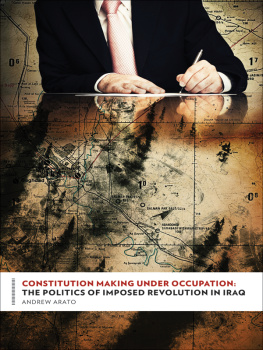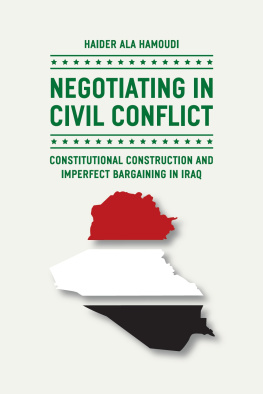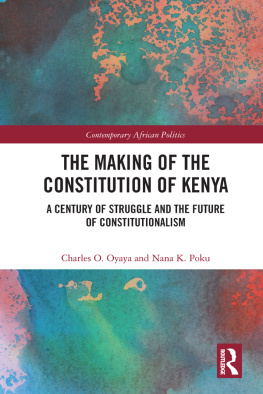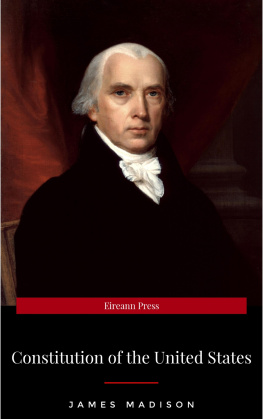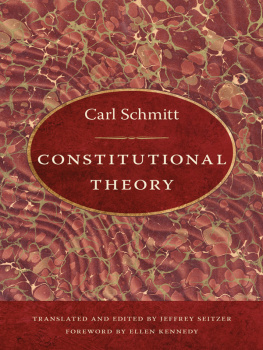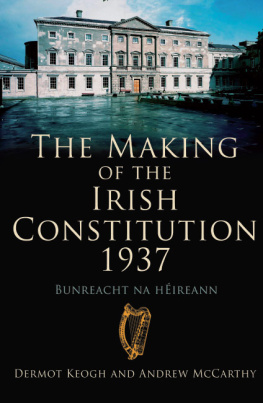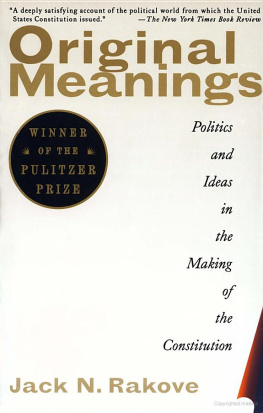Arato - Constitution Making Under Occupation
Here you can read online Arato - Constitution Making Under Occupation full text of the book (entire story) in english for free. Download pdf and epub, get meaning, cover and reviews about this ebook. year: 2009, publisher: Columbia University Press, genre: Politics. Description of the work, (preface) as well as reviews are available. Best literature library LitArk.com created for fans of good reading and offers a wide selection of genres:
Romance novel
Science fiction
Adventure
Detective
Science
History
Home and family
Prose
Art
Politics
Computer
Non-fiction
Religion
Business
Children
Humor
Choose a favorite category and find really read worthwhile books. Enjoy immersion in the world of imagination, feel the emotions of the characters or learn something new for yourself, make an fascinating discovery.
Constitution Making Under Occupation: summary, description and annotation
We offer to read an annotation, description, summary or preface (depends on what the author of the book "Constitution Making Under Occupation" wrote himself). If you haven't found the necessary information about the book — write in the comments, we will try to find it.
Arato: author's other books
Who wrote Constitution Making Under Occupation? Find out the surname, the name of the author of the book and a list of all author's works by series.
Constitution Making Under Occupation — read online for free the complete book (whole text) full work
Below is the text of the book, divided by pages. System saving the place of the last page read, allows you to conveniently read the book "Constitution Making Under Occupation" online for free, without having to search again every time where you left off. Put a bookmark, and you can go to the page where you finished reading at any time.
Font size:
Interval:
Bookmark:
Constitution Making Under Occupation
COLUMBIA STUDIES IN POLITICAL THOUGHT / POLITICAL HISTORY
Columbia Studies in Political Thought / Political History
Dick Howard, General Editor
Columbia Studies in Political Thought / Political History is a series dedicated to exploring the possibilities for democratic initiative and the revitalization of politics in the wake of the exhaustion of twentieth-century ideological isms. By taking a historical approach to the politics of ideas about power, governance, and the just society, this series seeks to foster and illuminate new political spaces for human action and choice.
Pierre Rosanvallon, Democracy Past and Future, edited by Samuel Moyn (2006)
Claude Lefort, Complications: Communism and the Dilemmas of Democracy, translated by Julian Bourg (2007)
Benjamin R. Barber, The Truth of Power: Intellectual Affairs in the Clinton White House (2008)
Constitution Making Under Occupation
The Politics of Imposed Revolution in Iraq
ANDREW ARATO

Columbia University Press New York
Columbia University Press
Publishers Since 1893
New York Chichester, West Sussex
cup.columbia.edu
Copyright 2009 Columbia University Press
All rights reserved
E-ISBN 978-0-231-51243-5
Library of Congress Cataloging-in-Publication Data Arato, Andrew.
The imposed revolution and its constitution : Iraqi constitutional politics during the American occupation / Andrew Arato.
p. cm.(Columbia studies in political thought / political history)
Includes bibliographical references and index.
ISBN 978-0-231-14302-8 (cloth : alk. paper)
ISBN 978-0-231-51243-5 (e-book)
1. Constitutional lawIraq. 2. Constitutional historyIraq.
3. IraqPolitics and government.2003 4. Sistani, Ali al-Husayni.
5. Bremer, L. Paul 6. Postwar reconstructionIraq. I. Title.
KMJ2220.A97 2009
342.567dc22
2008030562
A Columbia University Press E-book.
CUP would be pleased to hear about your reading experience with this e-book at .
References to Internet Web sites (URLs) were accurate at the time of writing.
Neither the author nor Columbia University Press is responsible for URLs that may have expired or changed since the manuscript was prepared.
Contents
This book is part of a rescue operation: an attempt to redeem the still redeemable. The treasure it seeks to save lies not in the eighteenth century, or even in 1956, but in the recent history of democratic transformation. This treasure is about to be buriedwho knows for how longbecause of the perverse but revolutionary attempt of the Bush government to impose political democracy through military force and to use democratization as the ideological arm of a neoimperial project to establish a new type of control over the Islamic Middle East. That project is collapsing, but it threatens to bury worldwide projects for democracy and democratization under its rubble.
My concern here is for a dramatic new method of democratic constitution making, one that I call postsovereign, in the sense that first, the constituent power is not embodied in a single organ or instance with the plenitude of power, and second, that all organs participating in constitutional politics are brought under legal rules. This method, whose roots go back to the American Revolution and some experiments in more recent French history (19451946), was revived in Spain in the 1970s, practiced in central Europe during the years of regime change (19891990), and perfected in the Republic of South Africa in the 1990s. It is still practiced in Nepal in the present decade, but with few outside that country noticing. Its key characteristics are a two-stage process of constitution making (with free elections in between) and an interim constitution. The basic idea involves applying constitutionalism to both the result and the democratic process of constitution making. This method is the democratic alternative to revolutionary constitution making, which all too easily can step over the threshold to dictatorship. This method of constitution making was the one reluctantly adopted in Iraq by the countrys American rulers, and unfortunately the idea could very well be entirely compromised by that adoption. Already in Latin America, in the Andean republics, the alternative of revolutionary-populist sovereign constitution making has reappeared, and after Iraq it will offer itself, despite its already authoritarian processes and predictably authoritarian outcomes, as the better, more radical, and indeed more democratic alternative. People may very well forget the South African example, instead remembering Iraq when interim constitutions and bound constitutional assemblies are raised as political and legal options.
Of course, perhaps the constitution-making process will be entirely disregarded in the case of Iraq, since matters such as state destruction, insurrection, and civil war currently and rightly occupy everyones attention. Were Iraq an isolated, unique case that could never happen again, this might be possible. There is indeed little attention paid to Iraq in, for instance, Nepal, where the democratic transformation is indigenous (although some lessons could have been learned even here: for example, the desirability of avoiding co-opted transitional legislatures and the need to be extremely cautious with identity politics based on ethnicity). But the role of the United States in Iraq and the disasters it has caused make it unlikely that any aspect of this sad history will be forgotten. Remembered, it will likely be only as a series of cautionary tales, and the constitutional aspect will be one of these tales.
There have been recent democratic interventions and occupations along with an external role in constitution making before Iraq, in Bosnia, Cambodia, East Timor, and Afghanistan. None of the results have been very good, and the populist theories of participation that guided the international community that advised the constitution makers in these cases were also not very helpful. They opened the door almost without exception to executive dominance of the process. Yet most likely all of them will be remembered as preferable to what will be seen as the American approach typified by Iraq.
In my view, strangely enough, the method adopted in Iraq, born not of an American plan but of the conflict between the occupiers and the movement led by the Grand Ayatollah Sistani (if we forget the pathological aspects due to the persistence of imposition and exclusion throughout) was quite superior to what was implemented elsewhere during other occupations, including that of Japan (if not Germany). Yet because of what has happened in Iraq, future international efforts during military occupations are likely to avoid the specific instruments and policies used in that country. The story of Iraqi constitution making will not be forgotten, but it will be relegated to a dark chapter in the collective memory. At a time when there is a dramatic need to rethink the legal problems of when and how international interventions are permissibleand what to do during occupations after such interventionsforgetting or excluding some of the most important options available in constitution making is bound to have very negative consequences.
This book will focus primarily on constitution making in Iraq, in the context of both theoretical and comparative research. The theoretical focus of will be the problem of the state, distinguishing between revolution and liberation and between revolution and state destruction. Here I will compare Iraq to other efforts by the United States to impose constitutional revolutions from the outside, especially in Japan and Germany. The second chapter will focus on versions of what I see as the dominant contemporary paradigm of constitution making, and I consider from a theoretical point of view the special problems of the adoption of this method in Iraq. The third chapter, centered on Iraq entirely, discusses the political conditions of adopting this model. The penultimate and final chapters reconstruct in detail the making of the interim and permanent constitutions, respectively.
Next pageFont size:
Interval:
Bookmark:
Similar books «Constitution Making Under Occupation»
Look at similar books to Constitution Making Under Occupation. We have selected literature similar in name and meaning in the hope of providing readers with more options to find new, interesting, not yet read works.
Discussion, reviews of the book Constitution Making Under Occupation and just readers' own opinions. Leave your comments, write what you think about the work, its meaning or the main characters. Specify what exactly you liked and what you didn't like, and why you think so.

